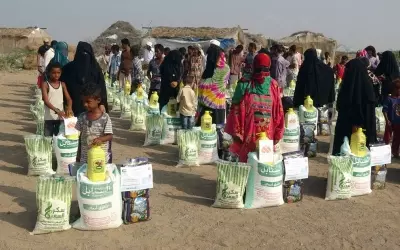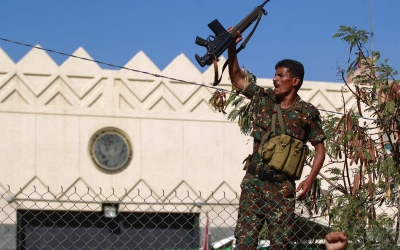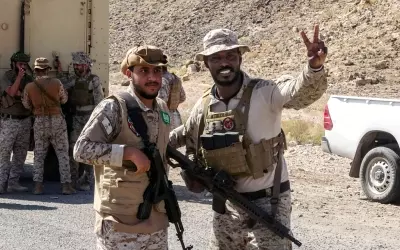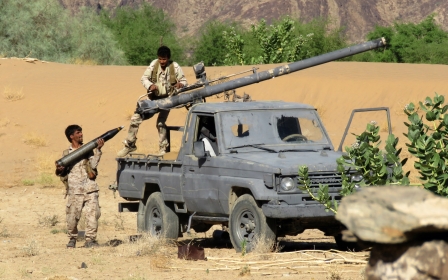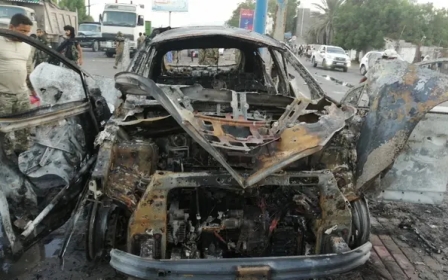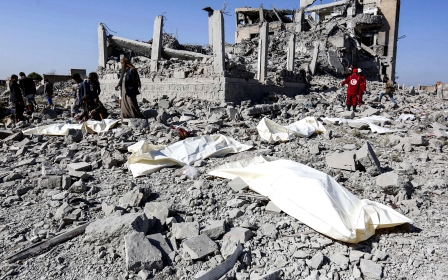Yemen: Residents return to Hodeidah as pro-UAE forces leave districts to Houthis
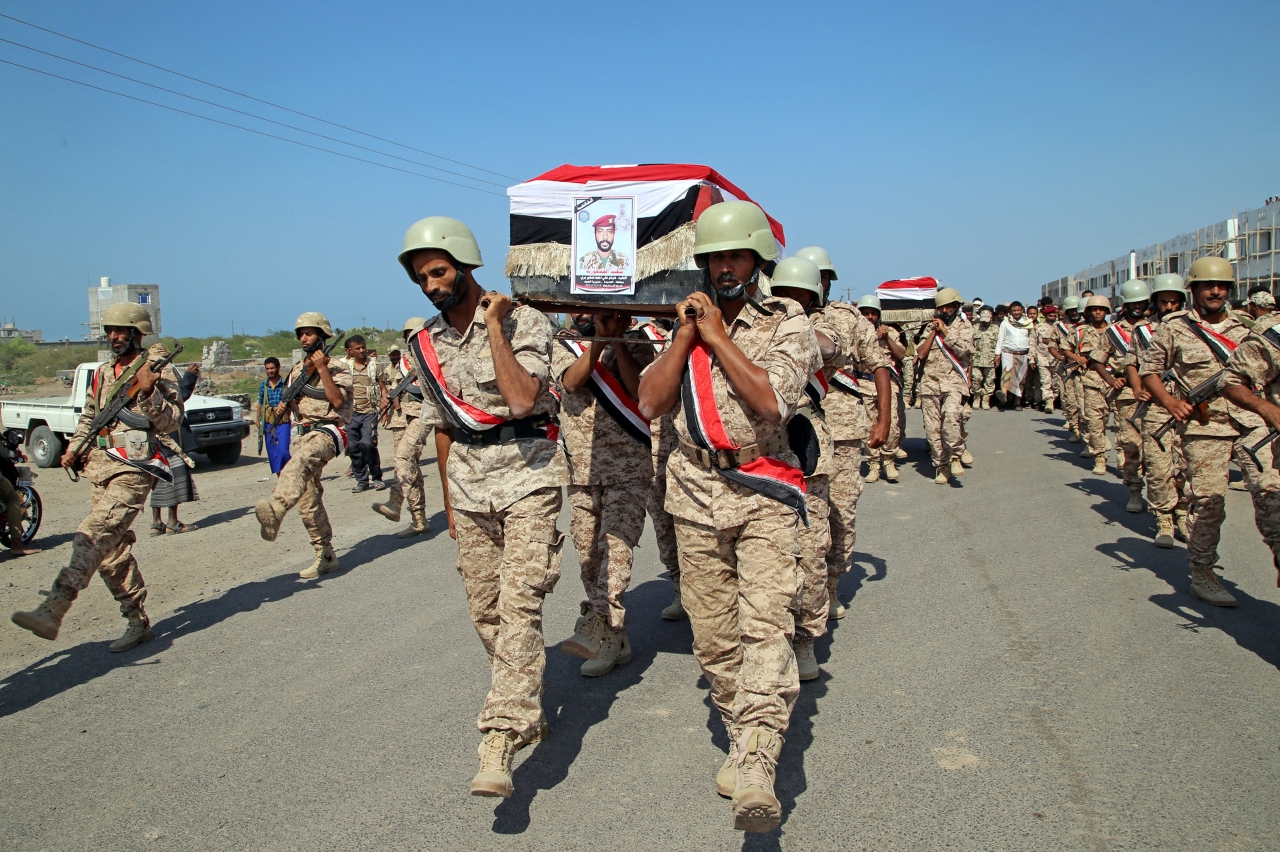
Mohammed Ghaleb, a resident of Hodeidah who had been displaced since 2018, returned to his home on Sunday, happy to see the city safe despite the destruction of many of its homes.
“I don’t care who controls Hodeidah, I only wanted to return to my home and see Hodeidah peaceful, as before the war,” he told Middle East Eye.
The unexpected withdrawal of pro-United Arab Emirates (UAE) forces from areas to the south of Hodeidah, Yemen's major Red Sea port, on Friday has left many residents excited at the prospect of restarting their lives.
However, the withdrawal has now shifted the fighting to rural areas around the city, forcing thousands of other people to leave their homes.
Most of those families have been forced to relocate to areas near to Hodeidah, such as al-Khawkha district.
Ahmed Nasser, a fisherman in his 40s, fled his home in al-Tuhaytah on Friday, along with his seven family members, to al-Khawkha, joining other displaced families in the area.
“We were asleep in our homes in al-Tuhaytah, which was far away from battles, but suddenly on Friday the Houthis advanced and the fighting moved into our area,” he told MEE.
“I didn’t know what happened, but the battles forced the residents of the whole village to flee at once. There was no fighting in other areas but in our area.”
Focusing on other fronts
Pro-UAE forces under the leadership of Tareq Saleh, the nephew of late President Ali Abdullah Saleh, had been in control of the al-Tuhaytah, Bait al-Fakih and al-Duraihimi districts of the Hodeidah governorate since May 2018.
However, on Friday night everything changed, as the forces withdrew peacefully and rebel Houthis advanced across all three areas.
Known as the Joint Forces, the pro-UAE fighters are made up of Salah's own Republican Guards, the al-Amaliqah forces and the Tehami forces.
'We lost a lot of colleagues and saw many injured before we came within sight of Hodeidah city, and now the leadership is asking us to withdraw'
- pro-UAE fighter
Following their withdrawal, the Joint Forces released a statement saying they had exited these areas because they were included in the Stockholm agreement. The deal, signed in December 2018 by the parties of the conflict, stipulated an immediate ceasefire in Hodeidah and a strengthened UN presence in the city.
In their statement, the pro-UAE forces said that as they were not permitted to make further advances in Hodeidah under the agreement, they would be focusing on other fronts where they believed they could make progress.
On Monday, the United Nations stated that 6,200 persons had been displaced by the new front lines that have opened up as a result of the Joint Forces' withdrawal, and called on the warring parties to resume peace talks.
'We lost a lot of colleagues'
Ahmed*, a fighter who was based in al-Duraihimi with Al-Amaliqah, told MEE: “We have been fighting in al-Duraihimi for more than three years and had our eyes on Hodeidah city, but on Friday we received instructions from our leadership to withdraw.
“We lost a lot of colleagues and saw many injured before we came within sight of Hodeidah city, and now the leadership is asking us to withdraw.”
Ahmed said he and his fellow fighters had been confused by the instructions, but there was nothing they could do. They are now based on the borders of al-Tuhaytah.
“Battles are still ongoing, but the difference now is that we are far away from Hodeidah city and more areas are now affected by this withdrawal,” he said.
“I feel that the international community supports the Houthi militia.
"In 2018 we were about to recapture Hodeidah city, but instructions came to stop advancing; and now this is more disappointing behaviour from the leadership.”
'I'm definitely very excited'
Ghaleb, whose family left Hodeidah to move to Sanaa, the capital, is overjoyed to be able to return.
“Three years of displacement is enough, and I'm definitely very excited to return and live in my home,” he said.
Returning on Sunday, he found his home damaged and has started repairing it, in preparation for bringing his family home soon.
“The windows of my home were broken, so I’m going to replace them, and paint the walls, and then immediately I will resume living in my neighbourhood where I have spent most of my life,” he said.
Ghaleb works as a food distributor with a local company and had to borrow money from friends and family to repair his home. Noting that other neighbours had already returned, he said: “Home is the best place in this world, so definitely I can’t wait to return and enjoy my life with neighbours.”
While regular life has almost returned to normal in Hodeidah, with no more shells or missiles falling, those in rural areas, where the fighting has intensified, are now bearing the brunt.
“We feel for the suffering of our brothers in al-Tuhaytah who can’t access their homes, and we hope that the war ends in the whole of the country, and Yemenis can return to their homes and resume their regular life,” Ghaleb told MEE.
Nasser the fisherman, now forced to relocate to the al-Khawkha district, had witnessed battles in al-Tuhaytah in 2018, but until Friday there had been no fighting and he had managed to resume his work.
While some of his colleagues had fallen victim to landmines, especially as they made their way to the sea, he had at least been able to earn a living.
“Now these days are worse than before," he said. "We used to fear the landmines, but now we can't sail anymore, and we are displaced families in this desert, waiting for organisations to help.”
Tents made from plastic sheets
Those forced to move since Friday are just the latest to join the approximately four million displaced persons in Yemen. Many of them live in makeshift camps and are in dire need of basic services. An estimated 80 percent of the population – 24 million people – require some form of humanitarian or protection assistance, including 14.3 million who are in acute need, according to the UN.
Nasser and his family are now trying to construct tents from plastic sheets and wood found in the desert. There are no basic services in al-Khawkha, and they were unable to bring anything of use with them from their homes.
“The sudden battles terrified us and we didn’t get a chance to take anything, all we took were valuables and clothes.”
* Names have been changed at the request of those interviewed
Middle East Eye delivers independent and unrivalled coverage and analysis of the Middle East, North Africa and beyond. To learn more about republishing this content and the associated fees, please fill out this form. More about MEE can be found here.


